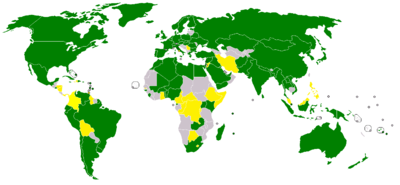Outer Space Treaty
From Wikipedia, the free encyclopedia
| This article needs additional citations for verification. Please help improve this article by adding reliable references (ideally, using inline citations). Unsourced material may be challenged and removed. (November 2008) |
|
The Outer Space Treaty, formally known as the Treaty on Principles Governing the Activities of States in the Exploration and Use of Outer Space, including the Moon and Other Celestial Bodies, is a treaty that forms the basis of international space law. The treaty was opened for signature in the United States, the United Kingdom, and the Soviet Union on January 27, 1967, and entered into force on October 10, 1967. As of January 2008, 99 countries are states-parties to the treaty, while another 26 have signed the treaty but have not yet completed ratification.
Contents |
[edit] Key points of the Treaty
The Outer Space Treaty represents the basic legal framework of international space law. Among its principles, it bars States Parties to the Treaty from placing nuclear weapons or any other weapons of mass destruction in orbit of Earth, installing them on the Moon or any other celestial body, or to otherwise station them in outer space. It exclusively limits the use of the Moon and other celestial bodies to peaceful purposes and expressly prohibits their use for testing weapons of any kind, conducting military maneuvers, or establishing military bases, installations, and fortifications (Art.IV). However, the Treaty does not prohibit the placement of conventional weapons in orbit.
The treaty explicitly forbids any government from claiming a celestial resource such as the Moon or a planet, since they are province of mankind. Art. II of the Treaty states, in fact, that "outer space, including the Moon and other celestial bodies, is not subject to national appropriation by claim of sovereignty, by means of use or occupation, or by any other means". The pendant for giving up sovereignty in outer space is the jurisdiction and control that the State that launches a space object retains. According to Manfred Lachs jurisdiction and control is giving the means to the State to conduct a mission of space exploration.[citation needed]
[edit] Responsibility for activities in space
Article VI of the Outer Space Treaty deals with international responsibility, stating that "the activities of non-governmental entities in outer space, including the moon and other celestial bodies, shall require authorization and continuing supervision by the appropriate State Party to the Treaty" and that States Parties shall bear international responsibility for national space activities whether carried out by governmental or non-governmental entities.
Following discussions arising from Project West Ford, a consultation clause was inserted in Article IX of the Outer Space Treaty: "A State Party to the Treaty which has reason to believe that an activity or experiment planned by another State Party in outer space, including the Moon and other celestial bodies, would cause potentially harmful interference with activities in the peaceful exploration and use of outer space, including the Moon and other celestial bodies, may request consultation concerning the activity or experiment."
[edit] Effect of the Outer Space Treaty
Experts of international space law state that the Moon falls under the legal concept of res communis, which means that it belongs to a group of people, and may be used by every member of the group, but cannot be appropriated by anyone (the concept is also applied to International Waters).[citation needed] The effect of the Outer Space Treaty is to restrict control of private property rights, in the way that the law of the sea prevents anyone owning the high seas.[citation needed] This is often disputed[citation needed] by those[1] who claim the ability to sell property rights on the Moon and other bodies, but the dispute has never been tested in a court of law.
[edit] Follow-ups
- The Moon Treaty of 1979 was meant to be the follow-up to the Outer Space Treaty, but failed to be ratified by any space-faring nation.
- Both the Space Preservation Treaty and the Space Preservation Act are expansions on the ban of weapons in space, being a ban on all weapons, instead of only nuclear and WMDs, but both so far have had minimal success.
[edit] See also
- High altitude nuclear explosion
- Militarization of space
- Space law
- Space Preservation Treaty
- Fractional Orbital Bombardment System
[edit] References
- J. Hickman and E. Dolman. "Resurrecting the Space Age: A State-Centered Commentary on the Outer Space Regime." Comparative Strategy. vol. 21, no. 1, (2002).
[edit] External links
- International Institute of Space Law
- Full text of the "Treaty on Principles Governing the Activities of States in the Exploration and Use of Outer Space, including the Moon and Other Celestial Bodies" in Arabic, Chinese, English, French, Russian, or Spanish
- "Space Law Probe""
- The Case for Withdrawing From The 1967 Outer Space Treaty
- Still Relevant (and Important) After All These Years: The case for supporting the Outer Space Treaty
- Squadron Leader KK Nair's "Space:The Frontiers of Modern Defence" Knowledge World Publishers, New Delhi, Chap-5 (Examining Space Law...), Pg 84-104, available at [2]
- "Land Sale's over the moon" Sydney Morning Herald, 13 October 2003



